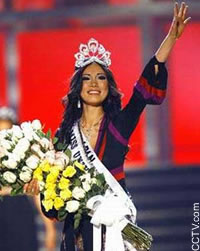 I have a confession to make: I watched the Miss Universe pageant Monday night. I could make some lame excuse like “nothing else was on television.” But the truth of the matter is that when choosing between elevating my mind with Al Gore’s new book and sinking into the comfy armchair in front of the flat-screen, I chose Miss Universe – live from Mexico City.
I have a confession to make: I watched the Miss Universe pageant Monday night. I could make some lame excuse like “nothing else was on television.” But the truth of the matter is that when choosing between elevating my mind with Al Gore’s new book and sinking into the comfy armchair in front of the flat-screen, I chose Miss Universe – live from Mexico City.
Miss Universe is a particularly embarrassing show to admit watching. Unlike Miss America, a pageant with a modicum of socially redeeming value (scholarships!), Miss Universe is an out-and-out ball gown and bathing suit spectacular. For decades, it was dominated by the blond-haired, blue-eyed likes of Miss Sweden, Miss France, and Miss USA. But this year was a different story.
Of the top 10 finalists, only one – Miss USA – represented the Anglo-European world. No Miss Sweden in sight (she actually dropped out because of social pressure at home that beauty pageants demean women). The other nine included: Miss Brazil, Miss India, Miss Japan (the eventual winner), Miss Angola, Miss Venezuela, Miss Korea, Miss Tanzania, Miss Nicaragua, and Miss Mexico, all citizens of the non-Western, post-colonial world. Even though they had been “Hollywoodized” to resemble Vogue models, they still carried distinctive aspects of their own cultures. Miss Tanzania was nearly bald – I have never seen a bald beauty pageant contestant before. Miss Japan’s modest evening gown looked more like a kimono than Christian Dior. Miss Brazil paraded around stage with Carnival flair.
In a kind of geo-political beauty contest metaphor, Miss USA tripped and fell during the evening gown competition. When she actually made the top five finalists, the Mexican audience jeered and booed like an angry soccer crowd. Were they irritated by our new immigration legislation? Maybe they don’t like George Bush? Whatever the case, Miss USA smiled graciously, and placed fourth.
The best moment, however, came when Miss Korea offered her testimony. While answering a question directed by the judges, she deftly said that she cared about missionary work more than anything else in the world – and that she wanted to be very rich so she could give much money to support the work of missionaries. Except for the accent, she sounded every bit like a Southern Baptist beauty contestant from Tennessee.
As I watched, I realized that I was witnessing a kind of Philip Jenkins (The Next Christendom) meets Miss Universe, a pop culture sort of post-colonial, post-feminist, and post-modern global gala – one to which Western Europeans were not being invited.
Of course, we were not very good hosts when we were the ones handing out invitations, as we expected everyone to come to our party our way. But as the gravity of pop culture moves south – as the gravity of religion already has – it might help for Miss USA’s fellow citizens to be prepared for some big changes, shifts in power, influence, understandings of truth, and yes, even the idea of beauty. I cannot fathom entirely what Miss Universe might portend for the future, but I do know that I do not want my nation to be booed off the world stage.

Although not many people know it, Diana Butler Bass (http://www.dianabutlerbass.com/) was once a debutante and was asked to compete in Miss Teen Arizona (she declined). Thirty years later, she holds a Ph.D. in religious studies from Duke University and is the author of six books, including her award-winning Christianity for the Rest of Us: How the Neighborhood Church is Transforming the Faith (Harper San Francisco, 2006).
